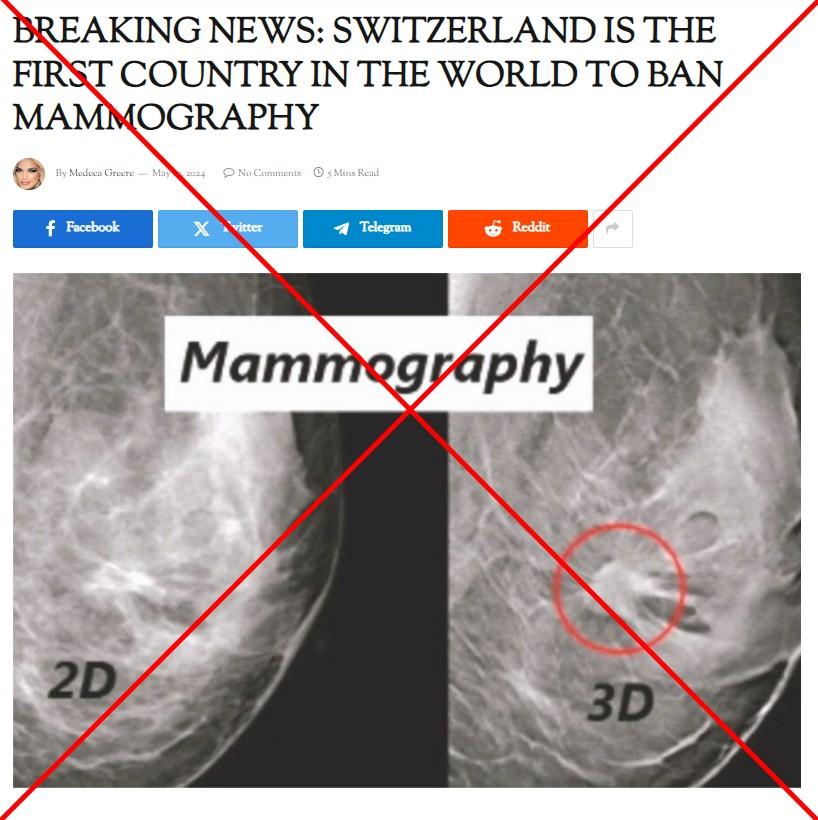
Mammography is not banned in Switzerland, suspended in Canada
- This article is more than one year old.
- Published on May 28, 2024 at 23:08
- Updated on May 29, 2024 at 15:41
- 4 min read
- By Gwen Roley, Claire-Line NASS, AFP Canada, AFP France
"SWITZERLAND IS THE FIRST COUNTRY IN THE WORLD TO BAN MAMMOGRAPHY," claims a May 8, 2024 X post. "Screening services are also suspended in parts of Canada, Italy, Scotland, and Australia."
Other posts on X and Facebook, including some in French, spread the same allegation with a screenshot contending the procedure produces incorrect results and stimulates tumor growth. Similar claims have circulated online since at least 2014.


Researchers have found a recent increase in breast cancer rates among younger people (archived here and here). The European Commission recommended in 2022 that the earliest age for breast screening programs be lowered to 45 to catch more early cases (archived here), while in Canada there are campaigns to standardize that age at 40 (archive here).
Doctors and health authorities are still debating the best age to begin breast cancer screening, but there is no truth to claims that mammography is banned in Switzerland.
Both the Federal Office of Public Health and the nonprofit Swiss Cancer League confirmed to AFP in separate May 14 emails that the country continues to offer the procedure.
"These rumors are totally false," the Swiss Cancer League said. "In Switzerland, mammography is currently the main method for detecting early-stage breast cancer."
AFP examined a few of the other claims shared in the social media posts.
No suspensions
Canada and the other countries mentioned in the posts recommend mammograms.
"Mammography is the only technique proven to be safe and effective in screening for breast cancer, and mammography equipment is the only imaging technique licensed by Health Canada for breast cancer screening," Health Canada says on its website (archived here).
Each province and territory sets its own cancer screening guidelines.
Health authorities in Prince Edward Island and British Columbia confirmed to AFP that mammograms are still available there (archived here and here). The Canadian Cancer Society website shows mammogram programs in all the other provinces (archived here), except Nunavut (archived here).
The territory told AFP its policies are based on the screening program at the Ottawa Hospital (archived here) and that services are not suspended.
The posts also mislead about mammograms in Australia, Scotland and Italy.
Keyword searches surfaced publications on government websites indicating all three countries have breast cancer screening programs using mammography (archived here, here and here).
'False positives'
The screenshot in many of the social media posts claims: "50-60% of 'positive' results are incorrect!!"
A March 2022 study (archived here) from the University of California-Davis cites similar figures when analyzing positive screenings that led to more diagnostic work but no eventual diagnosis of breast cancer (archived here).
Anna Wilkinson, a general practitioner-oncologist at the Ottawa Hospital Cancer Centre (archived here), said terminology is shifting from calling such instances "false positives" to "imaging recall."
"The mammogram was done, there's not quite enough information on the mammogram and a woman is asked to come back for some further imaging," Wilkinson said. "We're not telling these women that they have cancer."
She said such patients may repeat a mammogram or receive an ultrasound before progressing to a biopsy recommendation to determine a cancer diagnosis.
According to British Columbia Cancer, about nine percent of people will require additional diagnostic testing after their mammogram (archived here). However, 95 percent of recalled patients do not receive a breast cancer diagnosis (archived here).
Low radiation risk
The posts also warn against compression of the breast and claim: "Very sensitive mammary tissue is bombarded with radioactive radiation!!"
Paula Gordon, a radiology professor at the University of British Columbia (archived here), told AFP in November 2023 that while compression during a mammogram can be uncomfortable, it is quick.
"Compression is necessary during a mammogram to expand the tissue and detect cancers, but also to refine the breast to require less radiation," she said.
A 2013 Swedish study assessing whether compression could shed circulating tumor cells found no evidence for such a phenomenon and concluded that mammograms are not dangerous (archived here).
Health Canada says the body can repair cells that may be damaged by the radiation dose received during a mammogram.
"The benefit of early diagnosis and treatment for breast cancer far outweighs the risk of the small amount of radiation received during a mammogram," the agency says online (archived here).
'Overdiagnosis'
Wilkinson of the Ottawa Hospital also refuted claims that mammography leads to "overdiagnosis," or cases where patients are told to fight cancers that would not have caused harm if left untreated.
"It's very rare that there are cancers that don't grow or don't do anything or go away," she said.
Wilkinson pointed out that when the disease is caught early, patients have "higher survival rates than later-stage breast cancer, and the treatments you have to go through are much less intensive."
She said misinformation about mammography often traces back to the Canadian National Breast Screening Study performed in the 1980s (archived here).
The paper concluded mammograms generally do not reduce mortality rates and that patients are "overdiagnosed." However, its methodology has since been questioned because participants suspected of already having breast cancer were placed in the mammography control group (archived here and here).
"It's the only trial that has more breast cancers in the screening arm than the non-screening arm. And it's the only trial that showed harm with mammography and not benefit," Wilkinson said.
Other studies have examined overdiagnosis, particularly in patients older than 70, and advised doctors to consider personal risk factors when recommending additional screening (archived here). France's National Cancer Institute says researchers continue to work to identify slow-progressing cancers in order to offer appropriate treatment (archived here).
AFP has previously debunked claims that mammography is dangerous here.
Paragraph 18 was updated to clarify Anna Wilkinson's titleMay 29, 2024 Paragraph 18 was updated to clarify Anna Wilkinson's title
Copyright © AFP 2017-2026. Any commercial use of this content requires a subscription. Click here to find out more.
Is there content that you would like AFP to fact-check? Get in touch.
Contact us
